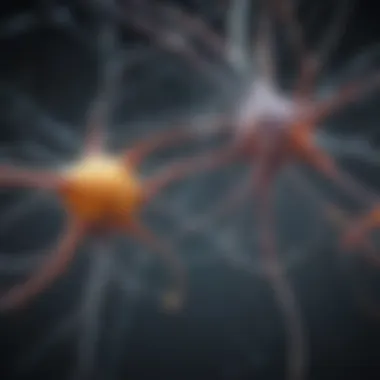Unraveling the Intricate Dance Between Mood and Mind


Strategies for Success
In our quest to unravel the complex interplay between mood and mind, it is crucial to establish precise and effective strategies for success. To embark on this enlightening journey, we must first delve into the intricate mechanisms governing our emotions and cognitive functions. By delineating the key components that underpin our mood influences and mental processes, we pave the way for a comprehensive exploration that transcends conventional boundaries of understanding.
Leadership Psychology Insights
Upon navigating the nuanced landscape of mood and mind dynamics, we encounter invaluable leadership psychology insights that shed light on the profound implications for individuals in positions of influence. By cultivating emotional intelligence in leadership roles, honing effective communication skills, and embracing innovative team-building strategies, one can navigate the intricate terrain of interpersonal relationships with finesse and insight.
Personal Growth and Development
As we traverse the terrain of mood and mind connectivity, the realm of personal growth and development emerges as a vital focal point. Here, mindset shifts for success play a pivotal role in shaping our cognitive landscapes, while self-care practices provide the necessary foundation for resilience and well-being. Moreover, overcoming challenges and adversities becomes a testament to the depth of human resilience and the transformative power of perseverance.
Business Growth Strategies
For ambitious entrepreneurs seeking to harness the synergy between mood and mind in a professional context, unveiling effective business growth strategies is paramount. From mastering marketing and branding techniques to incorporating sound financial management tips, the journey towards sustainable growth and entrepreneurial success is paved with innovation, dedication, and strategic acumen.
Case Studies and Real-Life Examples
To illuminate the intricate dance between mood and mind in practical contexts, delving into compelling case studies and real-life examples becomes imperative. By examining success stories of entrepreneurs, gleaning leadership lessons from industry experts, and studying transformative business turnaround cases, we gain invaluable insights into the dynamic interplay of emotions, intellect, and strategic decision-making.
Introduction (300-400 words):
In this article, we delve into the intricate interplay between mood and mind, shedding light on how our emotions influence cognitive processes and vice versa. Understanding the bidirectional relationship between mood and mental states unveils captivating insights into the human psyche's complex mechanisms.
Setting the Context
Defining Mood and Mind (250-300 words):
Defining Mood and Mind is crucial as it forms the foundation of our emotional and cognitive experiences. The essence of defining these constructs lies in unraveling the subtle nuances that shape our perceptions, decisions, and actions. By elucidating the intricacies of mood and mind, we can comprehend the underlying mechanisms that drive our behaviors and thoughts. This tailored approach ensures a precise exploration of human psychology, emphasizing the interconnected nature of emotions and cognition. Despite its complexity, defining mood and mind offers invaluable insights into the human experience, paving the way for a deeper understanding of our inner workings.


Significance of Studying Their Interaction (250-300 words):
Studying the interaction between mood and mind is pivotal in unraveling the tapestry of human experience and behavior. By investigating how these elements influence each other, we gain a comprehensive insight into the intricate dynamics shaping our responses to the world. The significance of this exploration lies in its ability to enhance our awareness of how emotions color our thoughts and vice versa. Understanding this interaction offers a unique perspective on decision-making processes, emotional intelligence, and overall well-being. The dynamic interplay between mood and mind underscores the importance of studying their interaction, providing a rich foundation for probing deeper into the complexities of human psychology and behavior.
Purpose of the Article (250-300 words):
Exploring the intricacies of the mood-mind connection serves as the central aim of this article. By delving into the nuanced relationship between these two facets of human experience, we aim to illuminate the ways in which our emotions intertwine with cognitive processes. This exploration not only sheds light on how mood influences our decision-making and perception but also brings to the forefront the reciprocal impact of cognition on our emotional states. By focusing on the inherent complexities of the mood-mind connection, we aim to provide a comprehensive understanding of these intertwined aspects, offering readers a deeper insight into the workings of the human mind.
Relevance to Personal and Professional Life (250-300 words):
The implications of understanding the mood-mind connection reach far beyond theoretical discourse, making a tangible impact on both personal and professional domains. By unraveling how mood influences decision-making, individuals can gain valuable insights into their choices and behaviors, fostering a more deliberate and informed approach to life. Additionally, exploring the impact of emotional intelligence on various aspects of life highlights the importance of self-awareness and self-regulation in navigating social and professional settings effectively. By integrating these insights into daily practices, individuals can enhance their emotional intelligence, leading to improved relationships, heightened resilience, and enhanced well-being.
The Role of Mood in Cognitive Processes
Emotional Influence on Perception
Effect of PositiveNegative Moods on Interpretation
In this segment, we unravel the impact of positive and negative moods on how individuals perceive information. The lens through which we view the world is tinted by our emotional state, affecting our judgments and interpretations significantly. Delving into the nuances of this influence provides a window into the multifaceted nature of human cognition. Understanding how positive moods may lead to more optimistic interpretations while negative moods can skew perceptions towards the darker aspects of reality showcases the intricate dance between mood and perception.
Memory Encoding and Retrieval
Association Between Mood States and Memory Performance
Exploring the association between mood and memory sheds light on how our emotional states can either enhance or impair memory functions. The connection between mood and memory performance underscores the intricate relationship between cognitive processes and emotional experiences. Delving into this aspect reveals the fascinating interplay between our mood states and the efficiency of encoding and retrieving information. Understanding how positive moods may facilitate better memory recall compared to negative moods underscores the relevance of mood in shaping memory functions.
Decision Making Under Different Moods
Influence of Emotions on Choices


This section delves into how emotions play a crucial role in the decision-making process. Examining how various mood states can influence the choices we make provides invaluable insights into the intersection between emotions and rational decision-making. By exploring the impact of emotions on choices, we illuminate how our mental states can sway decision outcomes, highlighting the intricate balance between rationality and emotional influence. Recognizing the significance of emotional cues in shaping decision outcomes underscores the complexity of human decision-making processes in different mood contexts.
Impact of Mental States on Mood
In this section, we delve into the crucial aspect of how mental states can significantly impact one's mood. Understanding the intricate relationship between our cognitive processes and emotional experiences is essential for comprehending the complexities of human psychology. By examining how our thoughts and feelings interplay, we gain valuable insights into the internal mechanisms that influence our overall well-being. The impact of mental states on mood extends beyond mere feelings to encompass cognitive biases, behavioral patterns, and neurological responses.
Cognitive Biases During Emotional States
Confirmation Bias and Mood
Confirmation bias is a prevalent cognitive bias that plays a substantial role in influencing our emotional states. Within the context of this article, confirmation bias and mood intertwine to shape our perceptions, decision-making processes, and overall emotional responses. Its key characteristic lies in the tendency to seek out information that aligns with pre-existing beliefs, reinforcing our current emotional state. In this article, exploring the connection between confirmation bias and mood offers a deeper understanding of how individuals interpret and react to various situations based on their emotional predispositions. Recognizing the impact of confirmation bias on mood allows for a comprehensive analysis of how our mental tendencies can either enhance or hinder emotional regulation.
Cognitive Flexibility in Regulating Mood
Adaptive Strategies for Emotion Regulation
The concept of cognitive flexibility in regulating mood centers around the adaptive strategies individuals employ to manage their emotional responses effectively. Within the framework of this article, understanding how cognitive flexibility influences mood regulation sheds light on the importance of mental adaptability in handling diverse emotional states. The key characteristic of adaptive strategies for emotion regulation lies in the ability to adjust one's cognitive processes to align with varying emotional contexts. By incorporating unique features such as mindfulness practices, cognitive reframing, and emotional resilience training, individuals can enhance their capacity to regulate mood fluctuations. Exploring the nuances of adaptive strategies for emotion regulation within this article provides readers with practical insights into developing sustainable methods for managing their emotional well-being.
Neurological Correlates of Emotional Responses
Brain Regions Involved in Mood Regulation
The discussion on neurological correlates of emotional responses focuses on identifying specific brain regions that play a critical role in regulating mood. Within the context of this article, exploring the involvement of brain regions in mood regulation unveils the intricate neural mechanisms that underlie emotional experiences. The key characteristic of brain regions involved in mood regulation lies in their interconnectedness and functional overlap in modulating emotional responses. By highlighting the unique features of these brain regions and their advantages in contributing to mood regulation, we gain a deeper appreciation for the neural complexity of emotional processing. Understanding the neurological correlates of emotional responses enhances our comprehension of how mood states are intricately linked to brain functioning, offering valuable insights into the intersection of cognitive and emotional processes.
Interplay Between Mood and Focus
In this section, we delve into the crucial relationship between mood and focus, highlighting its significance in understanding human cognition. The dynamic interplay between mood and focus plays a vital role in shaping our cognitive processes and behavior. By exploring how different mood states can directly impact our ability to concentrate and direct our attention, we uncover essential insights into the complexities of the human mind. Analyzing how mood influences our focus sheds light on the intricate mechanisms behind decision-making, problem-solving, and even emotional regulation.
Attentional Biases in Different Moods


Impact of Mood on Selective Attention
Delving deeper into the impact of mood on selective attention, we examine how different emotional states can alter our focus and perception. The unique characteristic of mood-induced attentional biases lies in their ability to filter information selectively based on our current emotional state. Understanding how mood influences our selective attention is key to unraveling the subtle yet profound ways in which our emotions shape our cognitive processes. This aspect is particularly valuable for this article as it provides a nuanced perspective on how our moods can either enhance or diminish our ability to attend to specific stimuli.
Task Performance and Emotional States
Enhancement or Impairment Based on Mood
Exploring how task performance is influenced by emotional states, we uncover the intricate relationship between mood and cognitive abilities. The key characteristic of this interaction lies in the varying impact that different moods can have on our productivity and efficiency in completing tasks. By discussing how mood can either enhance or impair our performance, we gain valuable insights into the complexities of emotion-cognition interplay. This aspect is crucial for our article as it highlights the importance of emotional regulation and maintaining optimal mood states for achieving peak performance in various tasks.
Mind-Wandering and Mood Regulation
Link Between Mood Variability and Wandering Thoughts
Unpacking the link between mood variability and wandering thoughts, we explore how fluctuations in mood can influence our tendency to engage in mind-wandering. The key characteristic of this relationship is its impact on our cognitive processes and emotional well-being. Understanding how mood variability can contribute to increased or decreased mind-wandering provides valuable insights into the mechanisms of mood regulation and attentional control. This aspect is particularly relevant for our article as it elucidates the intricate connection between mood stability and focused attention, shedding light on the implications of mood fluctuations on cognitive functioning.
Practical Applications and Strategies
Emotion Regulation Techniques
Mindfulness Practices for Mood Management
Mindfulness Practices for Mood Management play a pivotal role in promoting self-awareness and emotional regulation within the spectrum of mood and mind dynamics. The key characteristic of mindfulness lies in its ability to cultivate present-moment awareness without judgment, allowing individuals to observe their emotions objectively. This reflective practice enhances one's capacity to acknowledge and accept emotions, leading to effective mood modulation. Mindfulness, as highlighted in this article, stands out as a beneficial choice due to its empirically proven impact on reducing stress levels and enhancing emotional resilience. Its unique feature lies in the simplicity of the practice, requiring only focused attention and open awareness, making it accessible to individuals seeking to enrich their emotional well-being. While mindfulness empowers individuals to develop a non-reactive mindset towards their emotions, its potential drawbacks revolve around the need for consistent practice and commitment to reap long-term benefits.
Enhancing Cognitive Flexibility
Training Programs for Emotional Resilience
Training Programs for Emotional Resilience contribute significantly to the overarching goal of honing cognitive flexibility amidst varying mood states. These programs focus on equipping individuals with adaptive strategies to navigate challenging emotions and cultivate resilience. The key characteristic of such programs lies in their structured approach towards promoting emotional regulation and enhancing problem-solving skills. They emerge as a popular choice within this article due to their comprehensive curriculum, tailored interventions, and measurable outcomes. The unique feature of Training Programs for Emotional Resilience rests in their emphasis on building psychological resources that aid in managing stressors and setbacks effectively. While these programs offer various benefits, such as improved emotional well-being and enhanced coping mechanisms, potential disadvantages may include time constraints and the necessity for continuous engagement to maintain skill retention.
Integrating Mood Awareness in Daily Life
Journaling and Reflection Exercises for Emotional Insight
Journaling and Reflection Exercises for Emotional Insight serve as powerful tools for integrating mood awareness into daily routines, fostering introspection and self-discovery. The key characteristic of journaling lies in its ability to provide a structured platform for individuals to document their feelings, thoughts, and behavioral patterns. By engaging in reflective exercises, individuals gain valuable insights into their emotional landscape, enabling them to identify recurring patterns and triggers. This practice proves to be a popular choice within this article due to its flexibility and adaptability to individual preferences and schedules. The unique feature of Journaling and Reflection Exercises lies in the intimate self-exploration it facilitates, leading to heightened emotional self-awareness and increased emotional regulation skills. While journaling offers numerous advantages, including stress reduction and improved emotional processing, potential disadvantages may stem from inconsistent practice and the need for sustained commitment to derive lasting benefits.



